人教版(2019)必修第二册Unit 4History and traditions Reading and Thinking课件(34张ppt)
文档属性
| 名称 | 人教版(2019)必修第二册Unit 4History and traditions Reading and Thinking课件(34张ppt) | 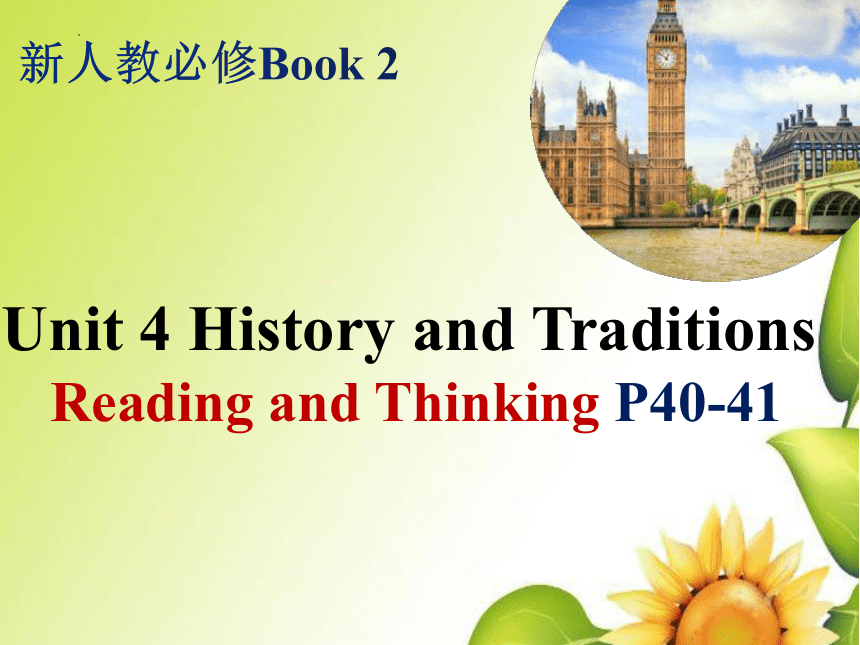 | |
| 格式 | zip | ||
| 文件大小 | 31.7MB | ||
| 资源类型 | 教案 | ||
| 版本资源 | 人教版(2019) | ||
| 科目 | 英语 | ||
| 更新时间 | 2022-07-14 15:58:39 | ||
图片预览


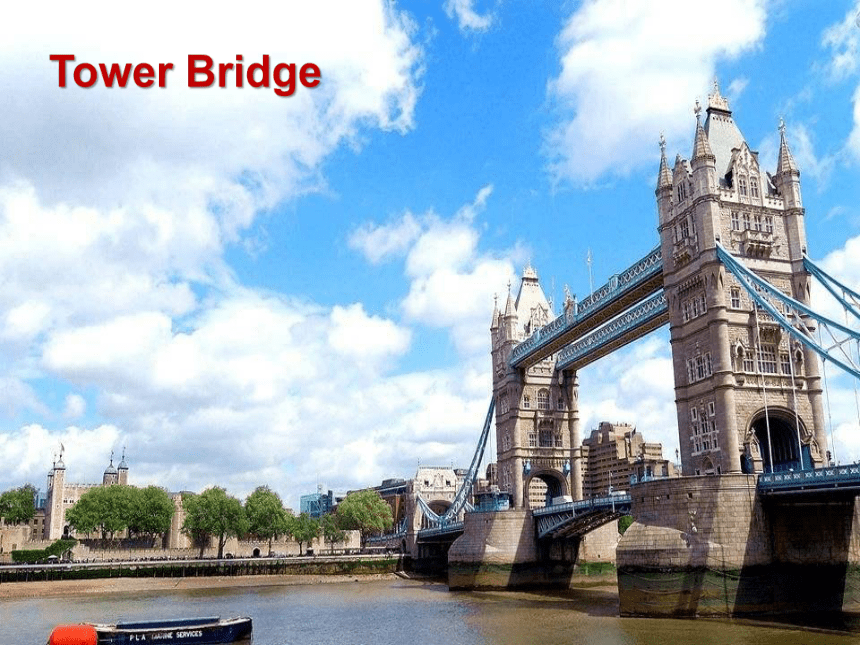
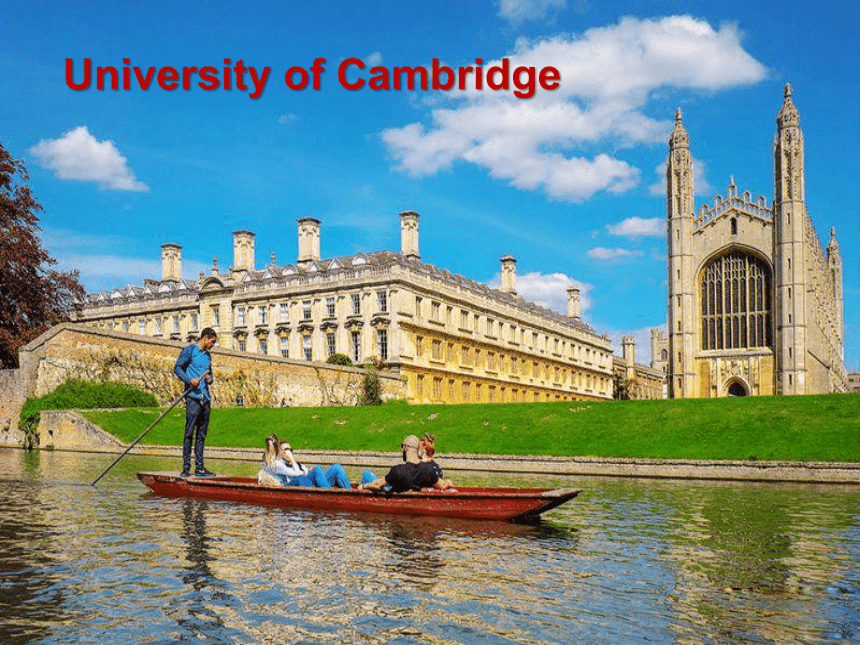
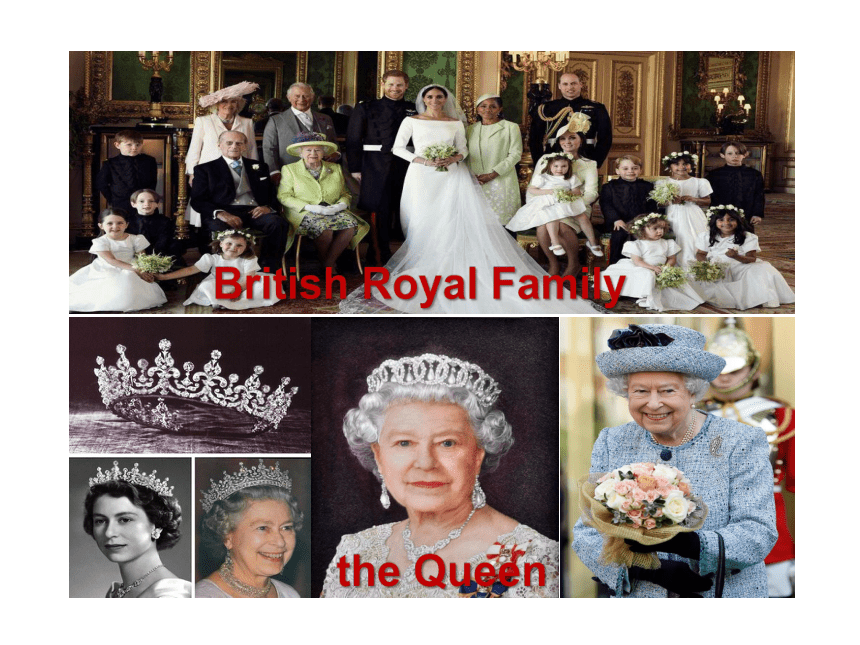
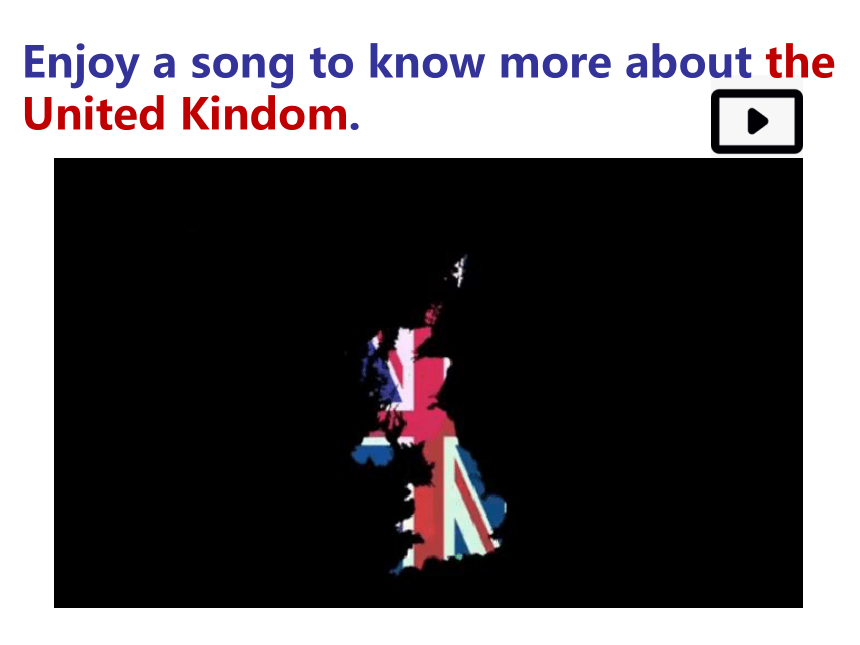
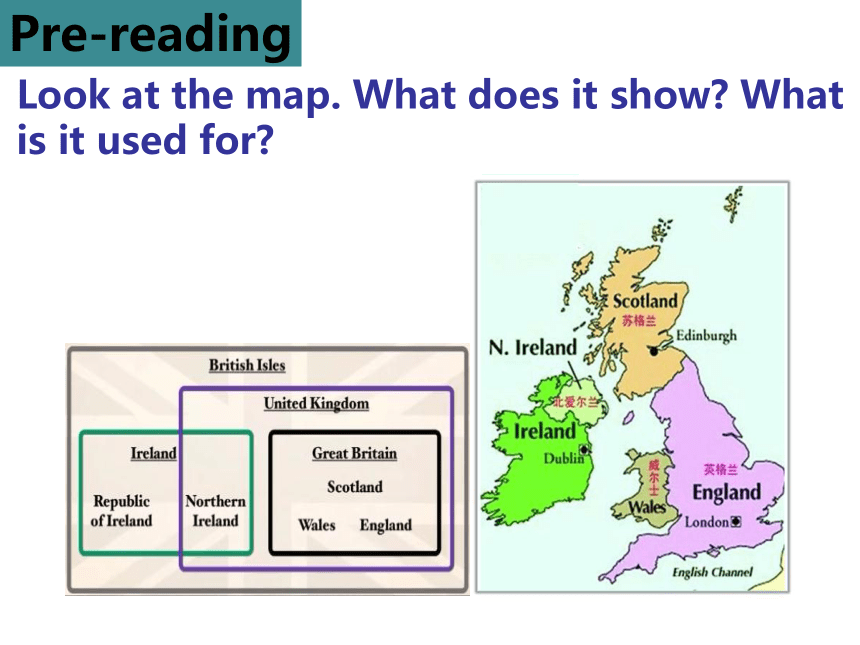
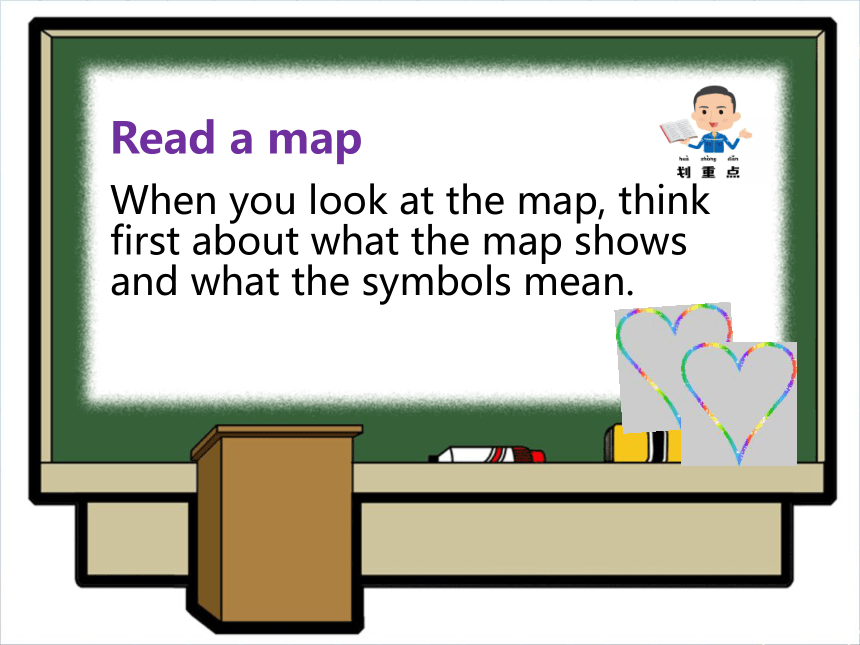
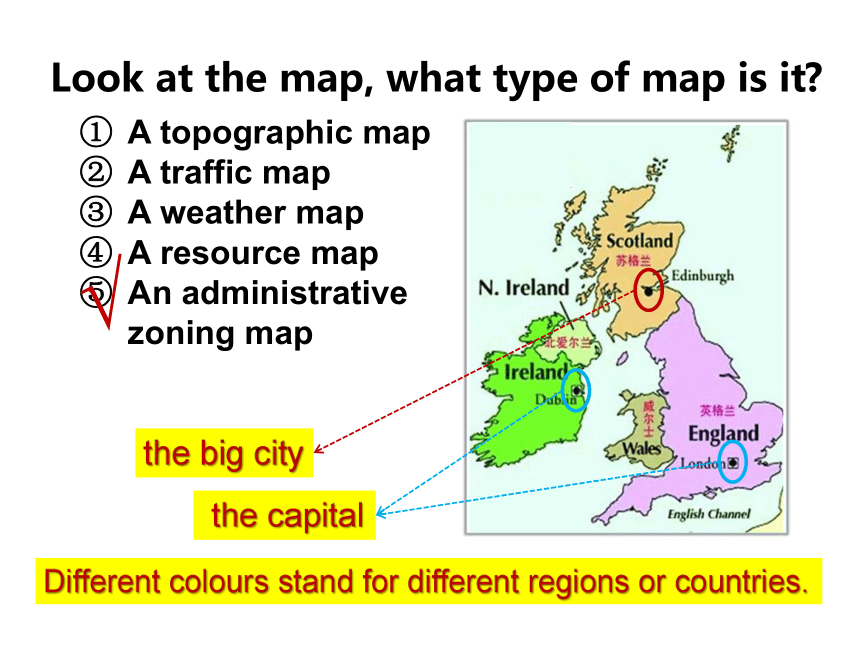
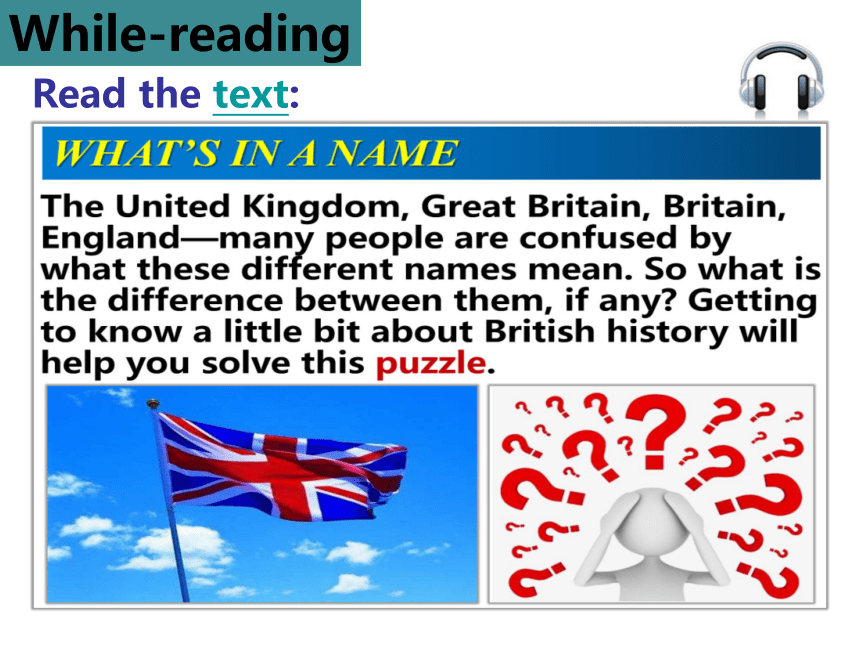
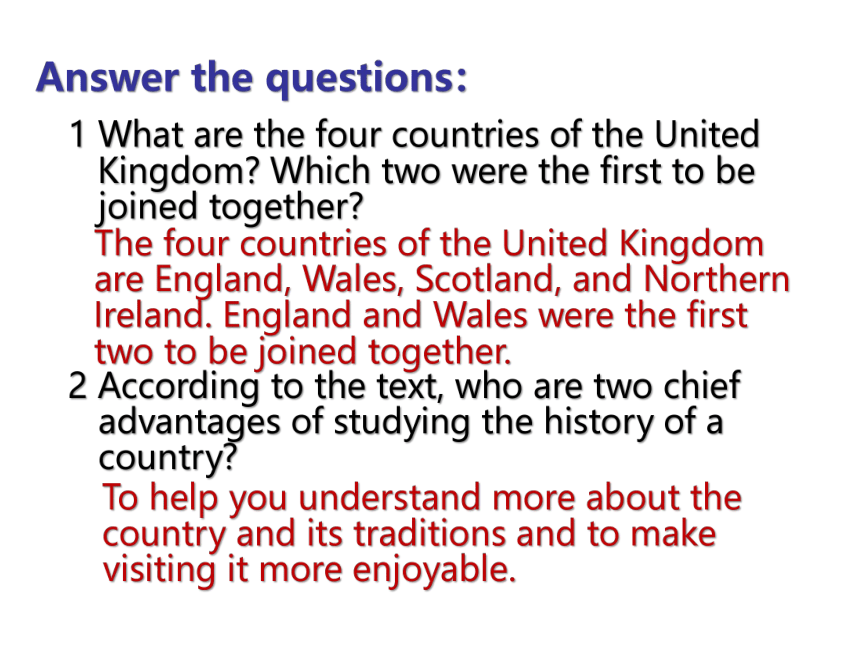
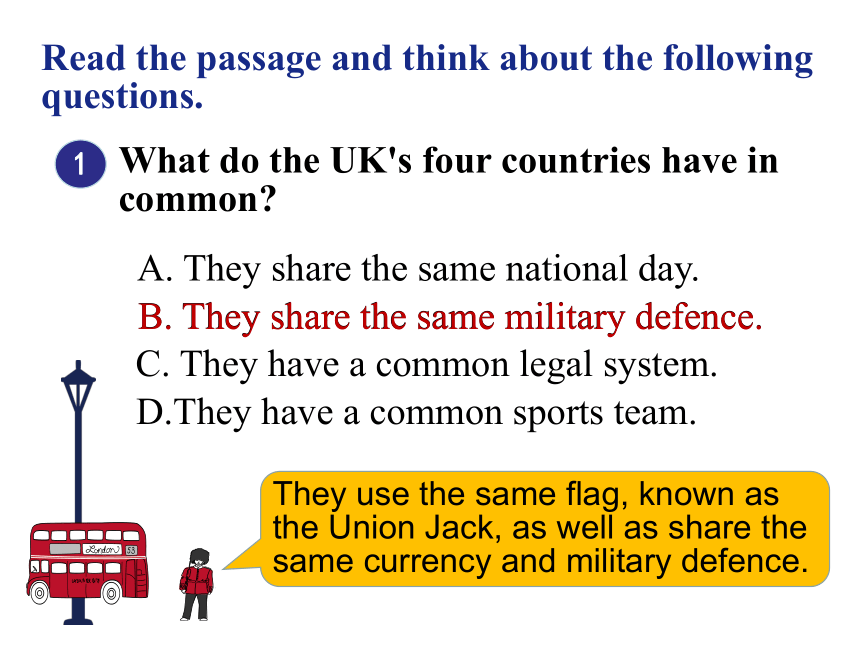
文档简介
(共34张PPT)
新人教必修Book 2
Unit 4 History and Traditions
Reading and Thinking P40-41
What do you know from the picture
Westminster Abbey
Big Ben
the River Thames
Westminster Bridge
Tower Bridge
University of Cambridge
British Royal Family
the Queen
Enjoy a song to know more about the United Kindom.
Pre-reading
Look at the map. What does it show What is it used for
Read a map
When you look at the map, think first about what the map shows and what the symbols mean.
Look at the map, what type of map is it
A topographic map
A traffic map
A weather map
A resource map
An administrative zoning map
√
the big city
the capital
Different colours stand for different regions or countries.
Read the text:
While-reading
1 What are the four countries of the United
Kingdom Which two were the first to be
joined together
2 According to the text, who are two chief
advantages of studying the history of a
country
Answer the questions:
The four countries of the United Kingdom
are England, Wales, Scotland, and Northern
Ireland. England and Wales were the first
two to be joined together.
To help you understand more about the country and its traditions and to make visiting it more enjoyable.
1
A. They share the same national day.
C. They have a common legal system.
What do the UK's four countries have in common
B. They share the same military defence.
Read the passage and think about the following questions.
D.They have a common sports team.
B. They share the same military defence.
They use the same flag, known as the Union Jack, as well as share the same currency and military defence.
2
A. The Normans.
C. The Vikings.
Which group of people was the first to set foot on the UK
B. The Romans.
Read the passage and think about the following questions.
D. The Anglo-Saxons.
B. The Romans.
The first group, the Romans, came in the first century.
3
A. The Romans built towns and roads in England.
C. The Normans became the conqueror of England.
What happened to England in the 11th century
B. The Anglo-Saxons brought in the English
language.
Read the passage and think about the following questions.
D. The Vikings introduced many new words into
English.
The last group were the Normans. They conquered England after the well-known Battle of Hastings in the 11th century.
C. The Normans became the conqueror of England.
4
What does the last paragraph mainly talk about
Read the passage and think about the following questions.
A. The attractions of the UK.
C. The historic sites of the UK.
B. The long and interesting history of the UK.
D. The past and the present of the UK.
A. The attractions of the UK.
When What happened What changed
Romans arrived
Ango-Saxons came
Vikings came
11th century
16th century
18th century
19th century
20th century
1st century
5th century
8th century
Normans conquered England after the Battle of Hastings
Wales was joined to Kingdom of England
Scotland was joined to England and Wales
Ireland was added
the southern part of Ireland broke away
towns and roads
language and way houses were built
castles built, legal system changed, and new words from French introduced
“Kingdom of Great Britain” formed
“United Kingdom of Great Britain and Ireland” formed
name changed to “United Kingdom of Great Britain and Northern Ireland”
vocabulary and names of locations across the UK
Read again and sort out the information according to the timeline.
Para1-3
Para 4
Para 4
Help us understand more about the
country and its traditions
Para 5
Make your visit more enjoyable
Help us understand why the UK has many different names
Main idea: The passage mainly talks about advantages
of studying British history.
What can studying the history of the UK help us
After-reading
Enjoy a video to know more about the United Kingdom Facts.
Discuss the questions in groups.
1. Why is it important to study the history and
culture of a country before visiting it
Studying a country' s history and culture before visiting it will help you understand the place better and have a more enjoyable experience. You will be able to interact better with the people and their culture and have a richer experience.
2. What important things should visitors know
about before they come to China
Visitors to China should know something about the history of the country and about the cultural traditions of the area being visited, such as the food eaten, or festivals celebrated there.
Language points P40-41
新人教必修Book 2
Unit 4 History and Traditions
课文回顾:
Two students are talking about what they've learned in the history class about the United Kingdom.
A: I can never remember what the UK means! There's
England, Britain, _________ Great Britain!
B: Well, it helps if you remember that there are four
countries that ________ the UK! That's why it's called
the United Kingdom.
A: Four countries I must have been asleep in that part
of our history class! So the first country was England,
and the others were ________ that
B: Yes, right. First England, then Wales, then Scotland.
The last country was Ireland, but later the southern
half didn't want to be ________ the United Kingdom.
A: Oh, I remember now! The southern part ___________
from Northern Ireland, right
B: Yes, you got it well remembered! But _____________
______ in history class next time!
as well as belong to add to join to
break away keep your eyes open
as well as
belong to
added to
joined to
broke away
keep your eyes
open
Complete the converstation about the UK using the phrases in the correct forms.
break away (from sb./ sth.) 脱离;背叛;逃脱
Finally, in the 20th century, the southern part of Ireland broke away from the UK, which resulted in the full name we have today: the United Kingdom of Great Britain and Northern Ireland.
1
句意:最后,在二十世纪时,爱尔兰南部脱离了联合王国,形成了今天的英国全称:大不列颠及北爱尔兰联合王国。
例:因为有这么多问题尚未解决,所以有些国家想要脱离联邦。
With so many problems unsettled, a few countries wanted to _____ ____ ____ the Union.
break away from
The fire broke ______ during the day and thus
no one was injured.
His car broke _____ on the way to work this
morning.
break down (机器)出故障,损坏; 化学物质
分解;垮掉;和谈失败
break in 闯入,破门而入;打断,插嘴
break into 破门而入;闯入
break off 打断;折断
break out (战争、火灾等) 突然发生;爆发
break up 分解;打碎,解体,分手
break a record 打破纪录
break the ice 打破僵局;打破冷场局面
【用适当的介词填空】
out
down
belong to意为“属于”,不用于进行时与被动语态;其-ing形式可作后置定语。
belongings n. 财产;所有物;相关事物
The four countries that belong to the United Kingdom work together in some areas.
2
句意:同属于联合王国的这四个国家在某些领域紧密合作。
例:① 文化遗产和自然风景属于每一个人,包括我们的后代。
Cultural relics and natural scenery ______ ___ everyone, including the generations to come.
belong to
【语法填空】
① The ink brush Song Dynasty painting called
Six Dragons once belonged ____ Emperor
Qianlong of the Qing Dynasty.
② For two years, the doctor with his assistants
did the research on top of Changbai
Mountain ________(belong) to Jilin Province.
to
belonging
② 在你参观期间有储存柜来储存你的东西。
Lockers are available to store any _________
during your visit.
③ 老师应归还属于孩子们的课余时间。
The spare time ________ __ the children
should be returned to them by the teachers.
belongings
belonging to
surround vt. 围绕;包围
surround... with... 用……包围……
be surrounded with/ by... 被……包围/环绕
surrounding adj. 周围的,附近的
surroundings n. 环境,周围的事物
Almost everywhere you go in the UK, you will be surrounded by evidence of four different groups of people who took over at different times throughout history.
3
句意:英国历史上有四个不同民族在不同历史时期执掌这个国家。无论你身处英国何方,这些民族的遗迹都随处可见。
【综合运用】
What do you think about the ____________ (surround) ecosystem
He became accustomed to the new
___________(surround).
They've surrounded the building _____ the police.
例:那个湖被树木环绕着,因此它周围的地区看上去很漂亮。我乐意在这样健康的环境中抚养我的孩子们。
The lake is surrounded with trees and so its surrounding area looks beautiful. And I'd like to bring up my children in such healthy surroundings.
surrounding
surroundings
with
“Studying the history of the country”,是动名词短语做主语,谓语动词用单数。make your visit more enjoyable, 是make的复合结构:make+宾语+宾语补足语,其中形容词enjoyable作宾语补足语。
Studying the history of the country will make your visit much more enjoyable.
4
句意:学习这个国家的历史,你的英国之旅将更为愉快。
【句子结构分析】
make的复合结构有:
① make sb. do sth. 使/让某人做某事
例:Our English teacher often makes us retell the texts.
当这样的句子变为被动语态时,原句中省略的动
词不定式符号必须要还原。
We are often made to retell the texts by our
English teacher.
英语老师让我们复述课文。
make sb./sth. done 使某人或某事被……常用于
make oneself known/heard/understood...
It's too noisy. I can't make my voice heard.
太吵了。被人听不见我的声音。
make + sb./sth. +adj. 使某人或某事(变得)……
The news made him happy.
这个消息使他很高兴。
make+ sb./sth. +n. 让某人或某物成为……
They all want to make Jim their monitor.
他们都想让吉姆当班长。
【语法填空】
Walking upright _____ it easy to find food or guard against enemies.
直立行走更容易找到食物提防敌人。
It's an opportunity to make the Chinese culture better _________(know) to international students.
These developments are likely to make our current problems with robocalls much ______(bad).
worse
makes
known
Thank you!
新人教必修Book 2
Unit 4 History and Traditions
Reading and Thinking P40-41
What do you know from the picture
Westminster Abbey
Big Ben
the River Thames
Westminster Bridge
Tower Bridge
University of Cambridge
British Royal Family
the Queen
Enjoy a song to know more about the United Kindom.
Pre-reading
Look at the map. What does it show What is it used for
Read a map
When you look at the map, think first about what the map shows and what the symbols mean.
Look at the map, what type of map is it
A topographic map
A traffic map
A weather map
A resource map
An administrative zoning map
√
the big city
the capital
Different colours stand for different regions or countries.
Read the text:
While-reading
1 What are the four countries of the United
Kingdom Which two were the first to be
joined together
2 According to the text, who are two chief
advantages of studying the history of a
country
Answer the questions:
The four countries of the United Kingdom
are England, Wales, Scotland, and Northern
Ireland. England and Wales were the first
two to be joined together.
To help you understand more about the country and its traditions and to make visiting it more enjoyable.
1
A. They share the same national day.
C. They have a common legal system.
What do the UK's four countries have in common
B. They share the same military defence.
Read the passage and think about the following questions.
D.They have a common sports team.
B. They share the same military defence.
They use the same flag, known as the Union Jack, as well as share the same currency and military defence.
2
A. The Normans.
C. The Vikings.
Which group of people was the first to set foot on the UK
B. The Romans.
Read the passage and think about the following questions.
D. The Anglo-Saxons.
B. The Romans.
The first group, the Romans, came in the first century.
3
A. The Romans built towns and roads in England.
C. The Normans became the conqueror of England.
What happened to England in the 11th century
B. The Anglo-Saxons brought in the English
language.
Read the passage and think about the following questions.
D. The Vikings introduced many new words into
English.
The last group were the Normans. They conquered England after the well-known Battle of Hastings in the 11th century.
C. The Normans became the conqueror of England.
4
What does the last paragraph mainly talk about
Read the passage and think about the following questions.
A. The attractions of the UK.
C. The historic sites of the UK.
B. The long and interesting history of the UK.
D. The past and the present of the UK.
A. The attractions of the UK.
When What happened What changed
Romans arrived
Ango-Saxons came
Vikings came
11th century
16th century
18th century
19th century
20th century
1st century
5th century
8th century
Normans conquered England after the Battle of Hastings
Wales was joined to Kingdom of England
Scotland was joined to England and Wales
Ireland was added
the southern part of Ireland broke away
towns and roads
language and way houses were built
castles built, legal system changed, and new words from French introduced
“Kingdom of Great Britain” formed
“United Kingdom of Great Britain and Ireland” formed
name changed to “United Kingdom of Great Britain and Northern Ireland”
vocabulary and names of locations across the UK
Read again and sort out the information according to the timeline.
Para1-3
Para 4
Para 4
Help us understand more about the
country and its traditions
Para 5
Make your visit more enjoyable
Help us understand why the UK has many different names
Main idea: The passage mainly talks about advantages
of studying British history.
What can studying the history of the UK help us
After-reading
Enjoy a video to know more about the United Kingdom Facts.
Discuss the questions in groups.
1. Why is it important to study the history and
culture of a country before visiting it
Studying a country' s history and culture before visiting it will help you understand the place better and have a more enjoyable experience. You will be able to interact better with the people and their culture and have a richer experience.
2. What important things should visitors know
about before they come to China
Visitors to China should know something about the history of the country and about the cultural traditions of the area being visited, such as the food eaten, or festivals celebrated there.
Language points P40-41
新人教必修Book 2
Unit 4 History and Traditions
课文回顾:
Two students are talking about what they've learned in the history class about the United Kingdom.
A: I can never remember what the UK means! There's
England, Britain, _________ Great Britain!
B: Well, it helps if you remember that there are four
countries that ________ the UK! That's why it's called
the United Kingdom.
A: Four countries I must have been asleep in that part
of our history class! So the first country was England,
and the others were ________ that
B: Yes, right. First England, then Wales, then Scotland.
The last country was Ireland, but later the southern
half didn't want to be ________ the United Kingdom.
A: Oh, I remember now! The southern part ___________
from Northern Ireland, right
B: Yes, you got it well remembered! But _____________
______ in history class next time!
as well as belong to add to join to
break away keep your eyes open
as well as
belong to
added to
joined to
broke away
keep your eyes
open
Complete the converstation about the UK using the phrases in the correct forms.
break away (from sb./ sth.) 脱离;背叛;逃脱
Finally, in the 20th century, the southern part of Ireland broke away from the UK, which resulted in the full name we have today: the United Kingdom of Great Britain and Northern Ireland.
1
句意:最后,在二十世纪时,爱尔兰南部脱离了联合王国,形成了今天的英国全称:大不列颠及北爱尔兰联合王国。
例:因为有这么多问题尚未解决,所以有些国家想要脱离联邦。
With so many problems unsettled, a few countries wanted to _____ ____ ____ the Union.
break away from
The fire broke ______ during the day and thus
no one was injured.
His car broke _____ on the way to work this
morning.
break down (机器)出故障,损坏; 化学物质
分解;垮掉;和谈失败
break in 闯入,破门而入;打断,插嘴
break into 破门而入;闯入
break off 打断;折断
break out (战争、火灾等) 突然发生;爆发
break up 分解;打碎,解体,分手
break a record 打破纪录
break the ice 打破僵局;打破冷场局面
【用适当的介词填空】
out
down
belong to意为“属于”,不用于进行时与被动语态;其-ing形式可作后置定语。
belongings n. 财产;所有物;相关事物
The four countries that belong to the United Kingdom work together in some areas.
2
句意:同属于联合王国的这四个国家在某些领域紧密合作。
例:① 文化遗产和自然风景属于每一个人,包括我们的后代。
Cultural relics and natural scenery ______ ___ everyone, including the generations to come.
belong to
【语法填空】
① The ink brush Song Dynasty painting called
Six Dragons once belonged ____ Emperor
Qianlong of the Qing Dynasty.
② For two years, the doctor with his assistants
did the research on top of Changbai
Mountain ________(belong) to Jilin Province.
to
belonging
② 在你参观期间有储存柜来储存你的东西。
Lockers are available to store any _________
during your visit.
③ 老师应归还属于孩子们的课余时间。
The spare time ________ __ the children
should be returned to them by the teachers.
belongings
belonging to
surround vt. 围绕;包围
surround... with... 用……包围……
be surrounded with/ by... 被……包围/环绕
surrounding adj. 周围的,附近的
surroundings n. 环境,周围的事物
Almost everywhere you go in the UK, you will be surrounded by evidence of four different groups of people who took over at different times throughout history.
3
句意:英国历史上有四个不同民族在不同历史时期执掌这个国家。无论你身处英国何方,这些民族的遗迹都随处可见。
【综合运用】
What do you think about the ____________ (surround) ecosystem
He became accustomed to the new
___________(surround).
They've surrounded the building _____ the police.
例:那个湖被树木环绕着,因此它周围的地区看上去很漂亮。我乐意在这样健康的环境中抚养我的孩子们。
The lake is surrounded with trees and so its surrounding area looks beautiful. And I'd like to bring up my children in such healthy surroundings.
surrounding
surroundings
with
“Studying the history of the country”,是动名词短语做主语,谓语动词用单数。make your visit more enjoyable, 是make的复合结构:make+宾语+宾语补足语,其中形容词enjoyable作宾语补足语。
Studying the history of the country will make your visit much more enjoyable.
4
句意:学习这个国家的历史,你的英国之旅将更为愉快。
【句子结构分析】
make的复合结构有:
① make sb. do sth. 使/让某人做某事
例:Our English teacher often makes us retell the texts.
当这样的句子变为被动语态时,原句中省略的动
词不定式符号必须要还原。
We are often made to retell the texts by our
English teacher.
英语老师让我们复述课文。
make sb./sth. done 使某人或某事被……常用于
make oneself known/heard/understood...
It's too noisy. I can't make my voice heard.
太吵了。被人听不见我的声音。
make + sb./sth. +adj. 使某人或某事(变得)……
The news made him happy.
这个消息使他很高兴。
make+ sb./sth. +n. 让某人或某物成为……
They all want to make Jim their monitor.
他们都想让吉姆当班长。
【语法填空】
Walking upright _____ it easy to find food or guard against enemies.
直立行走更容易找到食物提防敌人。
It's an opportunity to make the Chinese culture better _________(know) to international students.
These developments are likely to make our current problems with robocalls much ______(bad).
worse
makes
known
Thank you!
